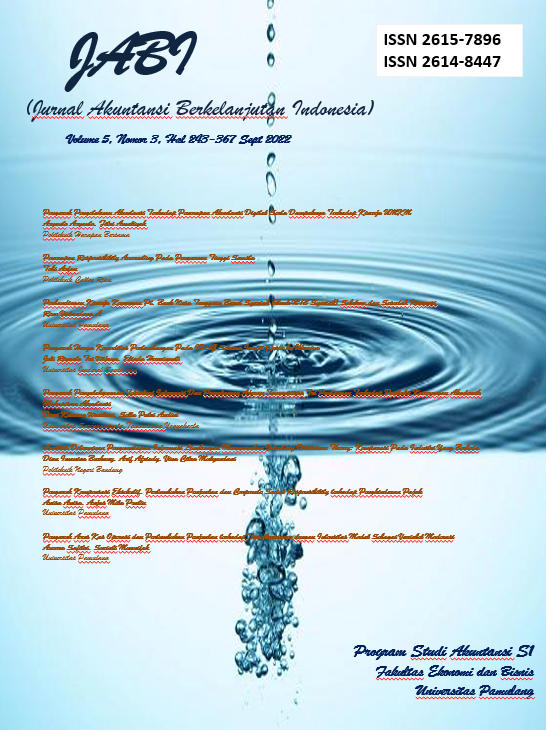The Impact Of Artificial Intelligence Technology On The Accounting Profession
Keywords:
Usefulness; Convenience; Artificial Intelligence; Accounting Profession.Abstract
The aim of this research is to determine the impact of the usefulness and convenience of artificial intelligence technology on the accounting profession based on the perspective of accounting students. This research includes survey research with questionnaires. The population in this study were 100 students from the Accounting Study Program at STIE Sutaatmadjha Subang and Islamic University Antarbangsa Selangor Malaysia. Sampling used the purposive sampling method. The sample in this study was 74 Accounting students from STIE Sutaatmadjha Subang and 26 Accounting students from the Islamic University Antarbangsa Selangor Malaysia. The data analysis technique uses Linear Regression Analysis techniques and independent simple t-test. The results of this research show that the usefulness and convenience of artificial intelligence have a positive effect on the accounting profession. The magnitude of the influence of the usefulness and convenience of Artificial Intelligence technology on the accounting profession is 33.5%.
References
Agoes, S. (2012). Auditing: Petunjuk Praktis Pemeriksaan Akuntan Oleh Auntan Publik. Salemba Empat.
Ajzen, I. (2005). Attitudes, Personality And Behaviour. Mcgraw-Hill Education (Uk).
Alghafiqi, B. (2022). Dampak Teknologi Artificial Intelligence Pada Profesi Akuntansi. 4(6).
Ardianingsih, A. (2018). Audit Laporan Keuangan. Bumi Aksara.
Artificial Intelligence. (2024). In Wikipedia. Https://En.Wikipedia.Org/W/Index.Php?Title=Artificial_Intelligence&Oldid=1216785703
Bagana, B. D., Irsad, M., & Santoso, I. H. (2021). Artificial Intelligence As A Human Substitution? Customer’s Perception Of The Conversational User Interface In Banking Industry Based On Utaut Concept. Review Of Management And Entrepreneurship, 5(1), 33–44.
David, J. M., Kantor, J., & Greenberg, I. (1994). Possible Ethical Issues And Their Impact On The Firm: Perceptions Held By Public Accountants. Journal Of Business Ethics, 13(12), 919–937. Https://Doi.Org/10.1007/Bf00881662
Davis, F. D. (1989). Perceived Usefulness, Perceived Ease Of Use, And User Acceptance Of Information Technology. Mis Quarterly, 319–340.
Hartmann, F., Kraus, K., Anthony, R., & Govindarajan, V. (2020). Ebook: Management Control Systems, 2e. Mcgraw Hill.
Lisnasari, Nurainah, R., & Fitriyani. (2008). Faktor-Faktor Yang Mempengaruhi Minat Mahasiswa Akuntansi Untuk Mengikuti Pendidikan Profesi Akuntansi (Ppak).(Studi Empiris Di Universitas Indonesia). The 2nd Accounting Converence,1st Doctoral Colloquium And Accounting Workshop, Depok.
Mulyadi. (2014). Auditing (6th Ed.). Salemba Empat.
Nazarudin, H., & Sayd, A. I. (2023). Penerapan Teori Planned Of Behavior Untuk Memprediksi Niat Berkunjung Pada Obyek Wisata Kabupaten Lembata Di Masa Pendemi Covid 19. Jurnal Penelitian Manajemen Terapan (Penataran), 8(1), 104–110.
Prasetiyo, B. (2021). Pengaruh Artificial Intelegent Personal Assistant Pada Smartphone Terhadap Gaya Hidup Masyarakat Pada Antara Tv.
Rahayu, S., & Kusumah, R. W. (2010). Analisis Faktor-Faktor Yang Mempengaruhi Minat Untuk Mengikuti Program Pendidikan Profesi Akuntansi (Ppak)(Survey Pada Mahasiswa Dan Alumni Program Studi Akuntansi S1 Universitas X Bandung).
Rosmida, R. (2019). Transformasi Peran Akuntan Dalam Era Revolusi Industri 4.0 Dan Tantangan Era Society 5.0. Inovbiz: Jurnal Inovasi Bisnis, 7(2), 206. Https://Doi.Org/10.35314/Inovbiz.V7i2.1197
Setiari, N. K. E. (2023). Pengaruh Pengalaman Kerja, Etika Kerja Dan Motivasi Kerja Terhadap Kinerja Karyawan Pada Akana Boutique Hotel Sanur.
Sukarno, E. (2022). Sistem Pengendalian Manajemen (Pertama). Pt. Gramedia Pustaka Utama.
Supriyadi, E. I., & Asih, D. B. (2021). Implementasi Artificial Intelligence (Ai) Di Bidang Administrasi Publik Pada Era Revolusi Industri 4.0. Jurnal Rasi, 2(2), 12–22. Https://Doi.Org/10.52496/Rasi.V2i2.62
Tjandrawinata, R. (2016). Industri 4.0: Revolusi Industri Abad Ini Dan Pengaruhnya Pada Bidang Kesehatan Dan Bioteknologi. Https://Doi.Org/10.5281/Zenodo.49404
Yadav, A., Gupta, V., Sahu, H., & Shrimal, S. (2017). Artificial Intelligence-New Era. International Journal Of New Technology And Research, 3(3), 263339.
Downloads
Published
Issue
Section
License
Copyright (c) 2024 Sri Mulyati, Syifa Puji Lestari, Siti Hajar Bt. Ab. Hadi

This work is licensed under a Creative Commons Attribution 4.0 International License.
Authors who publish with this journal agree to the following terms:
- Authors retain copyright and grant the journal right of first publication with the work simultaneously licensed under a Creative Commons Attribution License that allows others to share the work with an acknowledgement of the work's authorship and initial publication in this journal.
- Authors are able to enter into separate, additional contractual arrangements for the non-exclusive distribution of the journal's published version of the work (e.g., post it to an institutional repository or publish it in a book), with an acknowledgement of its initial publication in this journal.
- Authors are permitted and encouraged to post their work online (e.g., in institutional repositories or on their website) prior to and during the submission process, as it can lead to productive exchanges, as well as earlier and greater citation of published work (See The Effect of Open Access)

This work is licensed under a Creative Commons Attribution-ShareAlike 4.0 International License.


 PUBLICATION ETHICS
PUBLICATION ETHICS FOCUS AND SCOPE
FOCUS AND SCOPE EDITORIAL TEAM
EDITORIAL TEAM REVIEW PROCESS
REVIEW PROCESS CONTACT US
CONTACT US AUTHOR GUIDELINES
AUTHOR GUIDELINES




